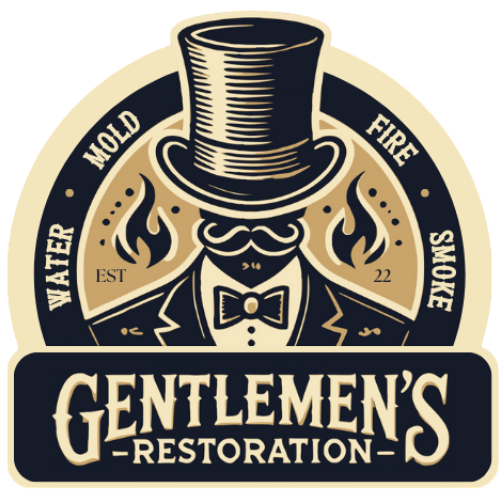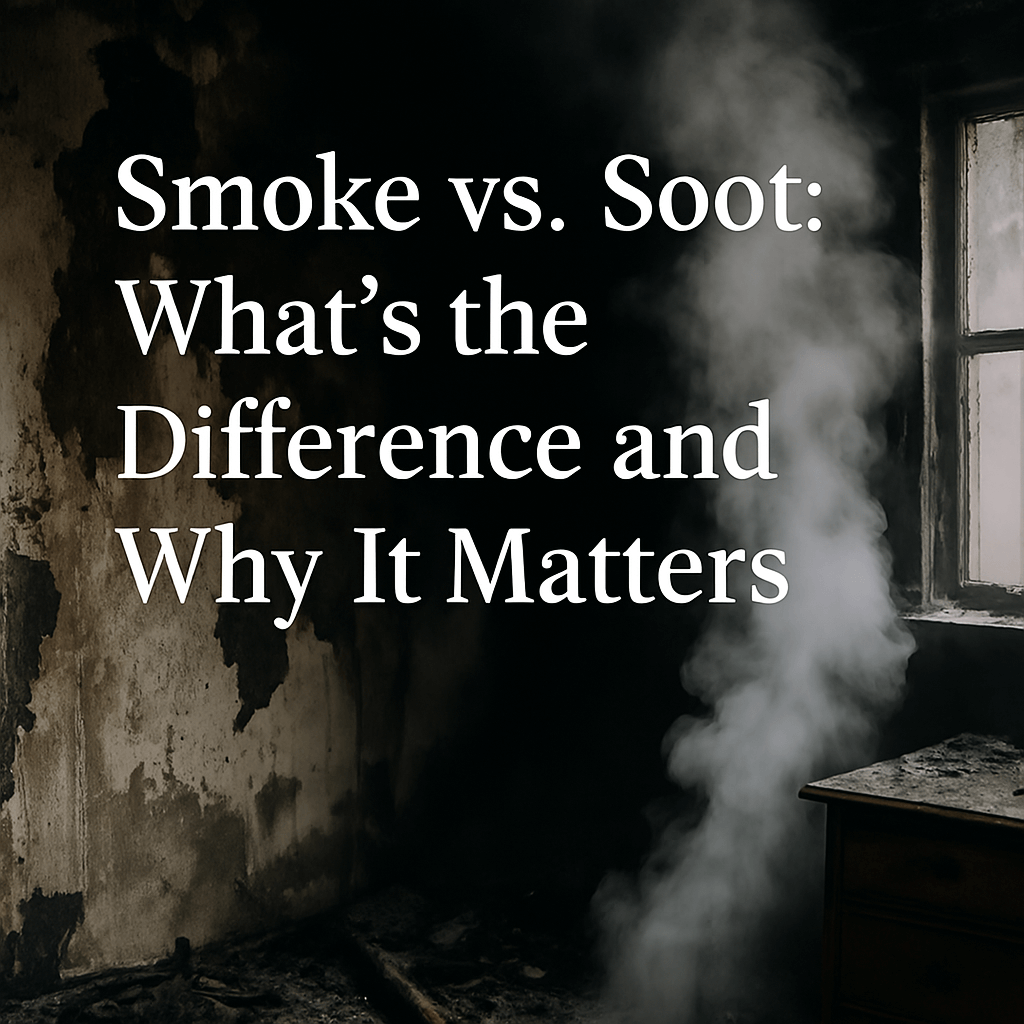What’s Lurking After the Fire? Smoke and Soot Explained
When a fire happens in your home whether it’s a major blaze or something smaller like a stovetop flare-up the damage doesn’t end when the flames go out. The two biggest things left behind are smoke and soot. And while most people use those words interchangeably, they’re actually very different. Knowing what they are and how they affect your home can help you make better decisions during the restoration process.
At Gentlemen’s Restoration, we help families and businesses across Dallas and North Texas clean up after fires, big and small. In this post, we’ll break down the real difference between smoke and soot, why it matters, and how we safely get rid of both. If you’re dealing with a recent fire or just want to be prepared, you’re in the right place.

What Is Smoke?
Smoke is what you see in the air during a fire. It’s made up of gases, vapors, and very fine particles released as materials burn. The way it looks—and how harmful it is—depends on what’s burning. A grease fire in the kitchen releases a different type of smoke than a fire that starts in an attic full of insulation and wood.
Smoke can travel quickly through your home, even into rooms that weren’t directly affected by the fire. It seeps into:
- Air vents and HVAC systems
- Furniture and curtains
- Clothing and bedding
- Wood, drywall, and flooring
And here’s the big issue: once smoke gets into something, the odor can linger for months if it’s not treated properly.
What Is Soot?
Soot is what’s left over after smoke settles. It’s the black, powdery, or greasy residue that clings to walls, ceilings, floors, and pretty much any surface. It’s made up of carbon particles and may also contain acids, chemicals, or toxic materials—especially if plastic or treated wood burned in the fire.
Soot can look different depending on the fire:
- Dry soot: powdery, easy to smudge, and often found when paper or natural materials burned.
- Wet soot: sticky, greasy, and much harder to clean common in kitchen fires or fires involving plastics.
- Protein soot: practically invisible, but it smells terrible and sticks to everything. It’s common with kitchen fires.
No matter the type, soot is not just dirty it’s hazardous. Breathing in soot particles can irritate your lungs, especially if you already have asthma or allergies. That’s why it’s so important to clean it up the right way.
Why the Difference Matters (And Why You Shouldn’t DIY It)
Understanding the difference between smoke and soot isn’t just about trivia—it’s about protecting your health and home.
Here’s why it matters:
- Different materials need different cleaning methods. Wet soot can smear if you try to wipe it, and dry soot can become airborne if you scrub too hard. The wrong cleaning technique can make things worse.
- Smoke travels where soot can’t. You might not see smoke damage, but your home can still smell like a campfire weeks later if the odor isn’t neutralized properly.
- Some smoke and soot carry toxins. Burnt plastics, chemicals, and treated materials leave behind residue that’s dangerous to touch or breathe.
- HVAC systems spread it fast. Once smoke and soot enter your vents, they can cycle through your entire home every time the system turns on.
Trying to clean smoke and soot yourself with household cleaners can actually embed the damage deeper or spread it to other rooms. That’s why professional fire damage restoration isn’t just a cleanup it’s a full process.
How We Clean Smoke and Soot at Gentlemen’s Restoration
At Gentlemen’s Restoration, we follow a thorough, step-by-step fire cleanup process based on industry standards. Whether it’s a small kitchen fire or full-scale structural damage, here’s how we tackle smoke and soot:
Containment & Air Filtration
We begin by setting up containment zones and installing HEPA-filtered air scrubbers to pull fine particles out of the air and stop cross-contamination.
Surface Cleaning & Soot Removal
Next, we use the right tools and cleaning agents for the specific type of soot. We don’t just wipe it down—we remove it safely, without smearing or spreading.
Smoke Odor Neutralization
We begin by setting up containment zones and installing HEPA-filtered air scrubbers to pull fine particles out of the air and stop cross-contamination.
HVAC Cleaning
We begin by setting up containment zones and installing HEPA-filtered air scrubbers to pull fine particles out of the air and stop cross-contamination.
Restoration
We begin by setting up containment zones and installing HEPA-filtered air scrubbers to pull fine particles out of the air and stop cross-contamination.
Quick Tips: After a Fire, Do This First
- Don’t touch walls or ceilings with soot—it’ll smear and may stain permanently.
- Avoid using your HVAC system until it’s inspected—soot can spread through the vents.
- Keep windows closed to avoid letting in moisture, which can set smoke and soot deeper into materials.
- Call a professional ASAP—the sooner we act, the easier it is to clean.
